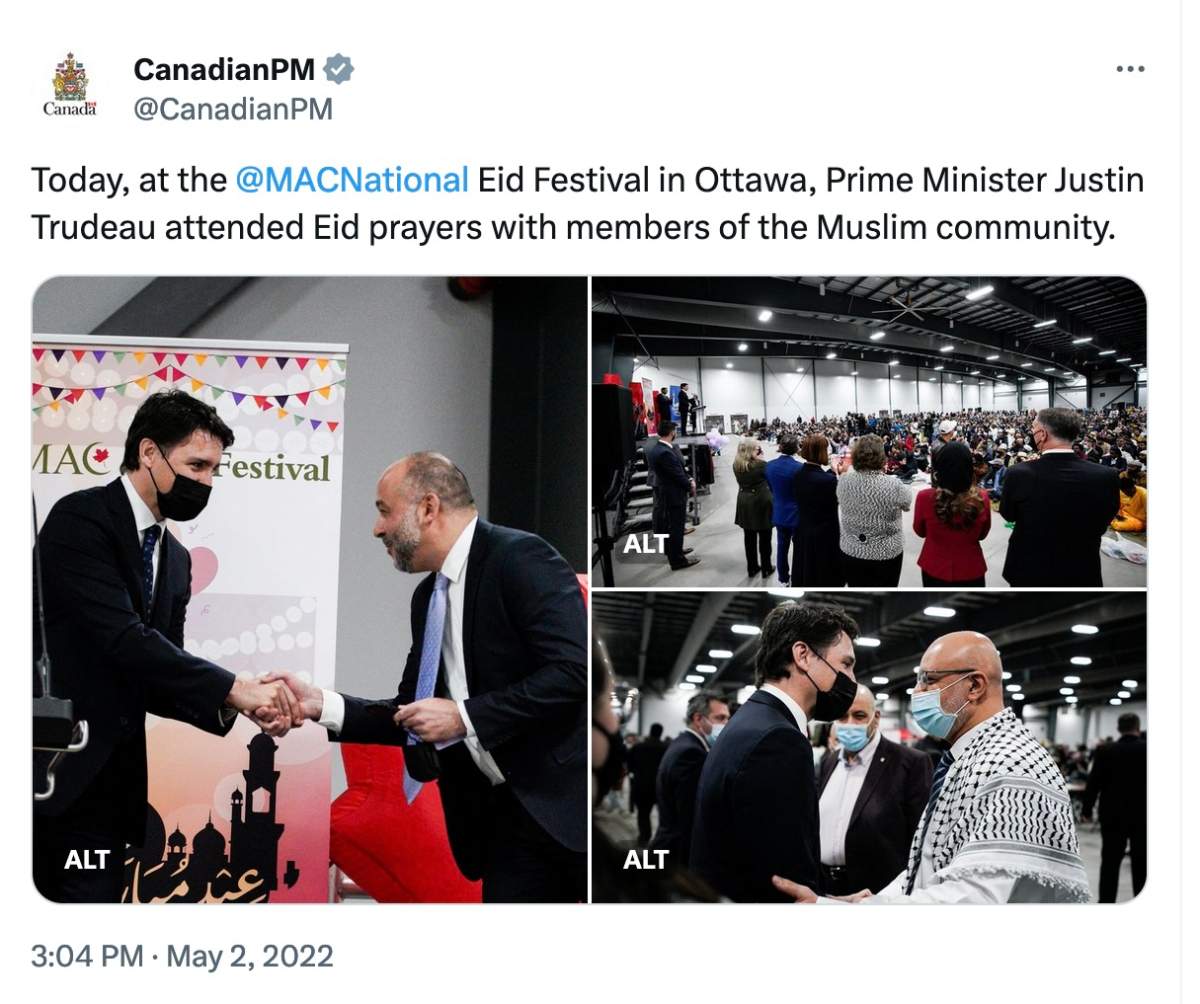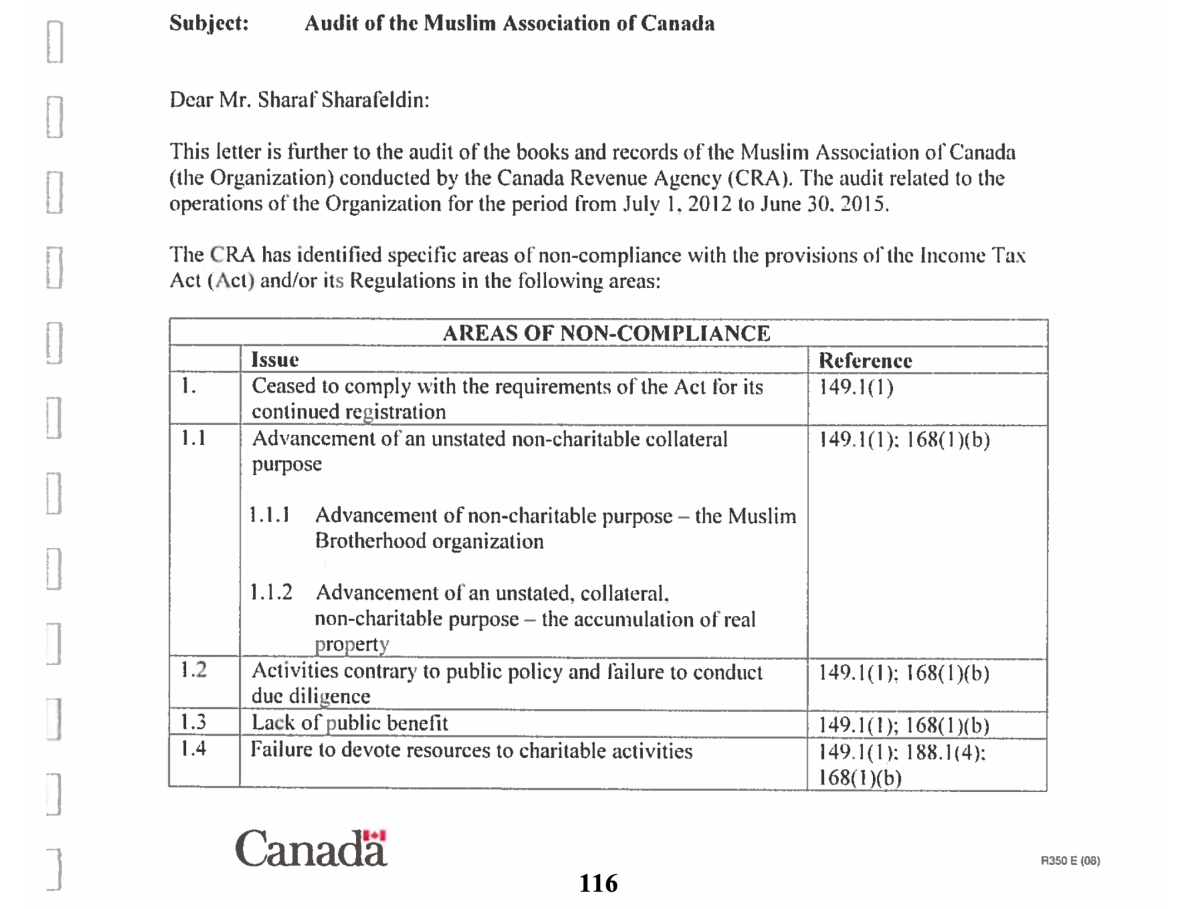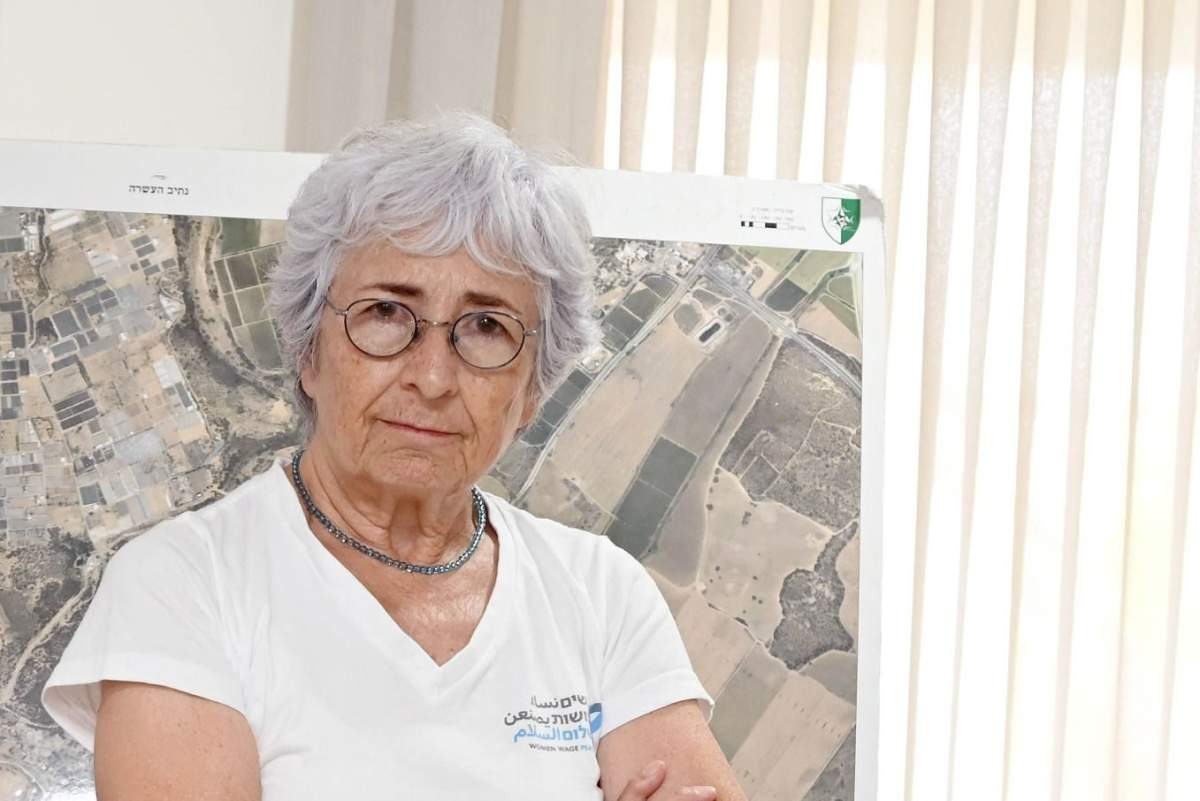EDITOR’S NOTE: This article has been updated to include a response sent to Global News by the Muslim Association of Canada after publication.

A government audit of one of Canada’s largest Muslim charities alleges some of its directors and employees were involved in “an apparent Hamas support network.”
Canada Revenue Agency auditors cited the “troubling” allegation as one of the reasons it felt there were grounds to revoke the charity status of the Muslim Association of Canada.
The March 2021 audit document, obtained by Global News, details the concerns the CRA charities branch raised about the federally-funded Muslim Association of Canada (MAC).
The 151-page report laid out the auditors’ preliminary concerns, before MAC had provided the CRA with its formal response. The concerns raised in the audit document have not been proven, and CRA’s final decision has not been made public.
MAC remains a registered charity in good standing. It has denied any wrongdoing and argues it is a victim of anti-Muslim bias. The auditors examined MAC’s records for the years 2012 to 2015.
Among the “areas of non-compliance” cited by the auditors were alleged ties to Egypt’s Muslim Brotherhood and IRFAN-Canada, which Canada has designated a terrorist entity due to its support for Hamas.
- Canadians involved in tourist bus crash in Dominican Republic, embassy says
- Canadians stuck in Middle East say cities ‘very tense’ as Iran conflict escalates
- Alberta mulls ditching time switch — again — as B.C. moves to permanent daylight
- As oil and gas prices rise amid Iran conflict, what comes next?
Hamas is the Iranian-backed Palestinian armed group that attacked Israelis on the weekend, killing more than 1,000, including at least three Canadians.
According to Public Safety Canada, Hamas “emerged from the Palestinian branch of the Muslim Brotherhood in 1987.”
Responding on Friday to questions, MAC said that passages quoted by Global News were taken out of context.
“The CRA has made a preliminary decision which has not taken effect. CRA and MAC can’t discuss the situation because of confidentiality rules set out in the Income Tax Act,” the statement said.
“We can confirm that MAC’s operations are not impacted in any way.”
“In our submissions to the CRA, our organization addressed CRA’s preliminary allegations comprehensively, and the CRA has taken into account all of MAC’s responses.
“CRA did not base its decision on any allegations that associated MAC with the Muslim Brotherhood, IRFAN Canada, Qatar Charity, or any of the other preliminary allegations mentioned by Global News in their questions to us.”
MAC tried to keep the audit report sealed, but a judge ordered its release.
IRFAN-Canada
In the report, the CRA Charities Directorate alleged MAC had “maintained a working relationship” with IRFAN-Canada, whose charity status was revoked in 2011 over an audit that found, among other things, that it sent millions to groups tied to Hamas.
That relationship continued well after the government stripped IRFAN-Canada of its charity status, the CRA alleged.
Despite publicly distancing itself from IRFAN-Canada following the government action, MAC went on to allow the group to “fundraise and promote itself at the organization’s events and properties,” the CRA wrote.
“The CRA has identified at least five instances whereby the organization permitted IRFAN-Canada (after its revocation) to participate in its programming,” according to the audit letter.
“In each instance the organization gave IRFAN-Canada a platform to promote its message and most egregiously gave IRFAN-Canada an avenue for which it could continue to solicit funds.”
Giving IRFAN-Canada “an opportunity to raise funds on the organization’s premises is tantamount to providing financial resources directly to IRFAN-Canada,” the auditors wrote.
In addition, MAC members used an “electronic mailing list to promote IRFAN-Canada’s events. It is important to reiterate that the events promoted occurred after IRFAN-Canada was revoked for in part supporting Hamas,” the CRA wrote.
In 2014, the government outlawed IRFAN-Canada as a terrorist entity. But MAC websites promoted IRFAN-Canada “after it was listed as a terrorist entity in Canada,” the auditors alleged.
The audit also said that some of MAC’s “most prominent members, directors, and officials were either involved in IRFAN-Canada, or a network of charities that appear to have been used to propagate and fundraise for Hamas in Canada.”

Get breaking National news
“The involvement of directors/employees in an apparent Hamas support network is troubling and may indicate why certain activities such as the continued support for IRFAN-Canada, were undertaken by the organization.”
In response, MAC has said that while it gave IRFAN-Canada almost $300,000 between 2001 and 2010, it stopped making contributions after the government revoked its charity status.
Yaser Haddara, a former MAC vice-president, wrote in an affidavit that his group “did not permit IRFAN to collect funds,” and said the CRA had been unclear about “what message IRFAN was promoting.”
‘Less than forthright’
Based in Mississauga, Ont., MAC calls itself the “largest grassroots Muslim organization” in Canada, with chapters in 13 cities. Prime Minister Justin Trudeau attended one if its events in 2022, after the CRA had raised its concerns.
Charity status allows groups to issue tax receipts to donors, so their contributions qualify as deductions. Last year alone, MAC also received more than $800,00 in federal funding to create summer jobs, according to the government website.
But the group has been “less than forthright with the public, the media, and with the CRA about its activities and how it undertakes them,” reads the audit letter sent to its president.
Last year, MAC tried without success to put a stop to the audit by appealing to the Ontario court. MAC argued the failure of the auditors to believe the charity’s representatives was consistent with an Islamophobic narrative.
In his ruling last month, the judge wrote that while he sympathized with many of MAC’s arguments, its application to halt the audit was premature since the CRA had not made a final decision at that time.
MAC also wanted the audit report sealed, but the judge declined, writing that such cases “must be litigated in public.”
“Without access to the core documents in this application, meaningful public discussion and criticism of state action on matters of significant public interest would be substantially impeded,” the judge wrote.
MAC has insisted the audit uncovered no evidence of terrorist financing or links to terrorist groups but was “replete with innuendos and guilt-by-association allegations.”
“The audit would never have been approached in the way it has been had the organization in question been a Jewish organization, a Christian organization, a Hindu organization, or an organization affiliated with any other major world religion,” it argued in court.
The CRA said in a statement to Global News that the audit document, called an Administrative Fairness Letter, was generally “issued to provide a charity with the CRA’s findings when an audit uncovers that a charity is not following the requirements of the Income Tax Act.”
The letter “explains in detail each of the CRA’s concerns and gives the charity the CRA’s preliminary view of whether the charity needs to take corrective actions or whether the non-compliance may warrant imposing sanctions, or revoking or annulling the charity’s registration.”
The CRA would not comment on the audit of MAC. But its report offers a detailed look at the controversial allegations federal charity regulators have levelled against the group.
MAC and the Muslim Brotherhood
In its audit letter to MAC, the CRA wrote that “preliminary audit findings appear to suggest that the organization has connections to individuals or groups associated with extremism, violence, and/or terrorism.”
In particular, it alleged, the “audit findings appear to indicate that there is a close association between the organization and the Muslim Brotherhood organization.”
“The audit found that the organization appears to conduct and support activities that further the advancement of the Muslim Brotherhood organization.”
The Muslim Brotherhood is an Egyptian movement whose ideology forms “the foundation for extreme ideologies that encourage, or support, violence and terrorism,” the CRA wrote.

While MAC denied ties to the group, the CRA wrote that “support for the Muslim Brotherhood by the organization’s senior leadership appears to be manifesting itself in the activities and decisions made with the organization.”
According to the CRA, while he was the MAC president, Wael Haddara worked on the election campaign of Mohamed Morsi, of the Muslim Brotherhood-affiliated Freedom and Justice Party, and Egypt’s president from 2012 to 2013.
When Haddara’s became active with Morsi, according to the CRA, he wrote that if asked about it, MAC should respond that it was “not aware of Dr. Haddara’s personal activities but he is away on Egypt for personal reasons.”
Dr. Haddara resigned from MAC board in December 2012.
“While no longer acting as president, Dr. Haddara maintained his membership in the organization and continued to contribute to high level discussions about the direction of the organization,” the CRA wrote.
The current MAC President, Sharaf Sharafeldin, also “worked in support” of Morsi’s campaign, and emails suggested the Muslim Brotherhood “appears to exhibit some authority” over him, the CRA wrote.
“The CRA is concerned about Mr. Sharafeldin’s apparent relationships with high ranking Muslim Brotherhood officials and the potential impact and influence these individuals could have on Mr. Sharafeldin and the organization.”
In his affidavit, the former MAC vice-president Yaser Haddara explained MAC was in a bind over the involvement of his brother Dr. Haddara in the Morsi campaign.
Although the CRA has alleged Dr. Haddara tried to hide his role in the campaign for an ulterior motive, that was not the case, according to the affidavit.
“MAC did not want to invite questions or accusations that MAC was somehow an arm of the Muslim Brotherhood,” he wrote.
The affidavit went on to say that “any apparent connection between MAC and the Muslim Brotherhood might give rise to unfounded allegations that MAC was involved in advancing a political purpose in another country or, worse, had ties to terrorism. This concern turned out to be prescient.”
There is no evidence Dr. Haddara’s role in the Morsi campaign impacted MAC’s role as a charity, he added.
He acknowledged that both Dr. Haddara and Sharafeldin had supported Morsi, “in opposition to the military dictatorship in Egypt.”
“It is hardly surprising that Egyptian-Canadians supported a pro-democracy movement in their home country in opposition to a military dictatorship. This does not mean that MAC, as an organization, is advancing the interests of the Muslim Brotherhood. Members’ personal political views and activities are not those of MAC.”
According to the affidavit, MAC is not affiliated with the Muslim Brotherhood or any foreign group, nor did it “receive directives or oversight from any other organization.”
The affidavit also took issue with the notion the Muslim Brotherhood was involved in violence and extremism, noting the group had not been blacklisted by Canada or the U.S.
It said the CRA had no evidence Muslim Brotherhood officials were “influencing Mr. Sharafeldin or MAC, let alone influencing them in a way that causes MAC to engage in an unstated, non-charitable collateral purpose.”
“I am not aware of members of Hindu or Sikh temples in Canada being prohibited from supporting political movements in India, or members of Jewish charities being prohibited from supporting political causes in Israel,” the affidavit responded. “The same standard should apply to Muslim Canadians.”
Money from Qatar
The auditors also said MAC received money from Saudi and other foreign donors, including “a considerable amount” from the Qatar Charity, part of the Union of Good, which the CRA wrote was a Hamas fundraising network.
“While the CRA did not find any evidence to suggest that the organization was being directly influenced by its foreign donors, the fact that such foreign donors are known to promote extremist ideology or association with terrorist groups is a concern,” according to the audit.
MAC defended the Qatar Charity as “internationally recognized,” and the judge on the case noted that “the fact that a donor to a charity also donates money to illegal causes does not mean that the charity is involved in the illegal causes that the donor supports.”
Stewart.Bell@globalnews.ca













Comments
Want to discuss? Please read our Commenting Policy first.